What is SEO and why is it vital for your business?
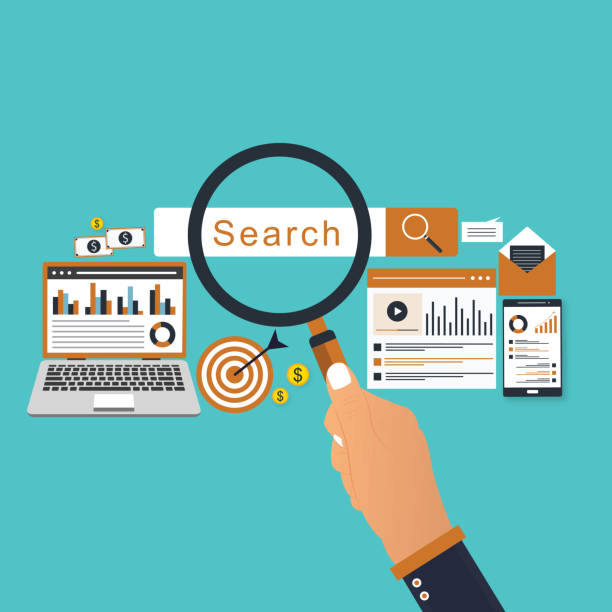
What is SEO?
#SEO (Search Engine Optimization) is a set of techniques and strategies used to improve a website’s ranking in search engine results like Google, Bing, and Yahoo.
The main goal of SEO is to increase organic (unpaid) website traffic and attract targeted audiences.
SEO includes two main sections, On-Page SEO and Off-Page SEO, each encompassing a set of activities.
Why is SEO important for your business?
In today’s digital world, a strong online presence is essential for the success of any business.
SEO helps businesses gain visibility to a wider audience and establish their brand as a trusted resource in their field.
SEO not only increases website traffic but also attracts more targeted traffic, as users who reach your website through search are looking for the information, products, or services you offer.
This leads to an increase in conversion rates and ultimately, an increase in sales and revenue.
Investing in SEO is a long-term investment that will yield significant returns.
Are you dissatisfied with the low sales of your online store?
Rasaweb is your solution for having a professional and high-selling online store.
✅ Significant increase in sales and revenue
✅ Easy and enjoyable shopping experience for customers
⚡ Get a free consultation from Rasaweb now!
Keyword research: a powerful tool in SEO

Finding the Right Keywords
Keyword research is the process of identifying words and phrases that users enter into search engines to find information, products, or services.
Choosing the right keywords is crucial for SEO, as your website needs to rank for terms that your target audience uses.
For keyword research, you can use various tools such as Ahrefs, Keywords Everywhere, Ubersuggest, and Google Keyword Planner.
How to Use Keywords in SEO
After finding suitable keywords, you should strategically incorporate them into your website’s content.
Keywords should be used in page titles, meta descriptions, headings, the main body of pages, image alt text, and page URLs.
However, it’s important to avoid overusing keywords, as this can lead to penalties from search engines.
Instead, try to integrate keywords naturally and smoothly into your content.
Creating high-quality content relevant to keywords is a key strategy in SEO.
On-Page SEO: Optimizing Web Pages
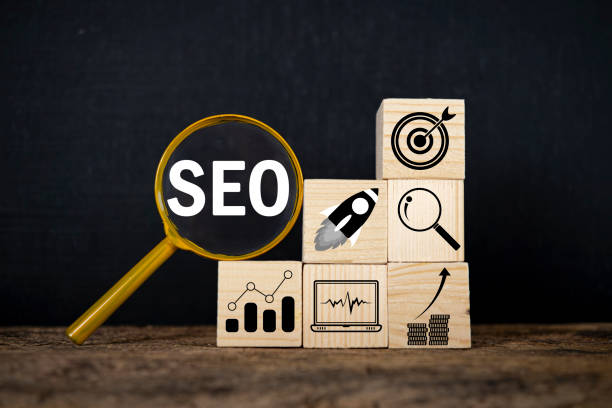
Optimizing Internal Site Elements
On-Page SEO involves optimizing various website elements for search engines and users.
These elements include:
- Page Titles: Page titles should be attractive, concise, and contain main keywords.
- Meta Descriptions: Meta descriptions should provide a summary of the page’s content and encourage users to click.
- Headings: Headings should have a logical and hierarchical structure, dividing page content into smaller sections.
- Page Content: Page content should be high-quality, relevant, comprehensive, and contain keywords.
- Images: Images should be optimized and have alt text.
- Page URLs: Page URLs should be short, readable, and contain keywords.
Creating a Table with CSS Style
For better understanding, you can view this sample table
| Element | Description |
|---|---|
| Page Title | Attractive, concise, contains keywords |
| Meta Description | Content summary, encourages clicks |
| Headings | Logical structure, content division |
Off-Page SEO: Link Building and Domain Authority
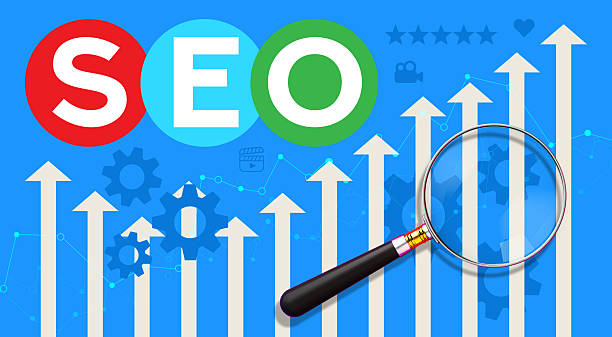
Importance of Link Building
Off-Page SEO involves activities performed outside your website aimed at increasing its authority and ranking in search engines.
The most crucial part of Off-Page SEO is link building.
Link building is the process of acquiring links from other websites.
The more numerous and higher quality the inbound links to your website, the greater your website’s authority and ranking in search engines will be.
This way, your SEO will improve.
Link Building Methods
There are various methods for link building, including:
- Creating high-quality content: Creating high-quality and engaging content that others will want to link to.
- Participating in forums and social media: Sharing your content on forums and social media and creating links to your website.
- Link exchange: Exchanging links with relevant and reputable websites.
- Buying links: Purchasing links from reputable websites (with caution).
Note that buying links from low-quality and irrelevant websites can lead to your website being penalized by search engines.
Link building is a very important factor in SEO.
Are you concerned about your online store’s low conversion rate and not achieving your desired sales?
Rasaweb is your specialized solution for a successful online store.
✅ Significant increase in conversion rate and sales
✅ Professional and user-friendly design to ensure customer satisfaction
⚡ Ready for a transformation in online sales? Get a free consultation!
User Experience (UX) and Its Impact on SEO
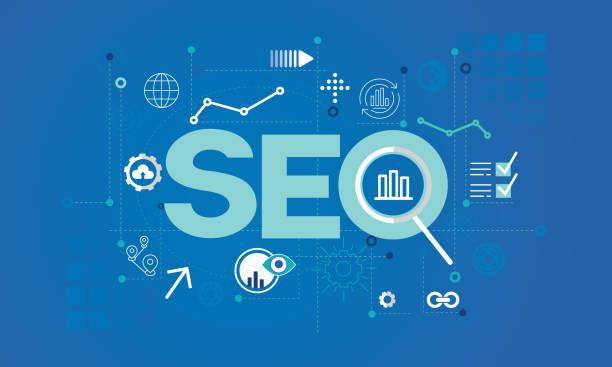
What is User Experience?
User Experience (UX) refers to a user’s feelings and perceptions when interacting with a product, system, or service.
For a website, UX includes ease of use, aesthetic appeal, page loading speed, Responsive Design, and Accessibility.
A website with good UX keeps users satisfied and loyal, encouraging them to return.
How Does UX Affect SEO?
Search engines like Google place significant importance on user experience.
Google uses complex algorithms to evaluate websites’ UX.
Factors such as Bounce Rate, Dwell Time, and Click-Through Rate all indicate user experience.
If users quickly leave your website or don’t spend much time on it, Google considers this a negative sign and lowers your website’s ranking.
Optimizing UX can help improve SEO.
Mobile SEO: Optimization for Mobile Devices

Importance of Mobile SEO
With the increasing use of mobile phones for internet searches, optimizing websites for mobile devices has become particularly important.
Since 2015, Google introduced the Mobile-First Indexing algorithm, which means your website’s mobile version is considered the primary version for indexing.
Therefore, if your website is not optimized for mobile devices, its ranking in search results will decrease.
Mobile SEO helps you
Key Points in Mobile SEO
To optimize your website for mobile devices, you should pay attention to the following points:
- Responsive Design: Use a responsive design so that your website automatically adapts to the screen size of various devices.
- Page Loading Speed: Increase your website’s page loading speed, as mobile users have less patience for waiting.
- Usability: Ensure that your website is easy to use on mobile devices and that users can easily find the content they are looking for.
- Image Optimization: Optimize your website images for mobile devices to reduce their size and increase page loading speed.
By following these tips, you can optimize your website for mobile devices and increase its ranking in search results.
Mobile SEO is important because most users access the internet via mobile.
Competitor Analysis: A Strategy for Success in SEO

Identifying Competitors
Competitor analysis is a crucial step in formulating an SEO strategy.
By analyzing competitors, you can identify their strengths and weaknesses and use them to improve your own SEO strategy.
The first step in competitor analysis is identifying your main competitors.
Your main competitors are websites that rank for similar keywords as you and have similar target audiences.
Analyzing Competitor Strengths and Weaknesses
After identifying competitors, you need to analyze their strengths and weaknesses.
For this, you can use various tools such as Ahrefs, SEMrush, and Moz.
These tools help you gather information such as the number of inbound links, keywords competitors rank for, website traffic, and competitor content.
By using this information, you can identify competitor strengths and weaknesses and use them to improve your SEO strategy.
| Criterion | Description |
|---|---|
| Inbound Links | Number and quality of inbound links to competitor’s site |
| Keywords | Keywords for which the competitor ranks |
| Website Traffic | Amount of traffic entering the competitor’s site |
Local SEO: Attracting Customers from Nearby Geographical Areas
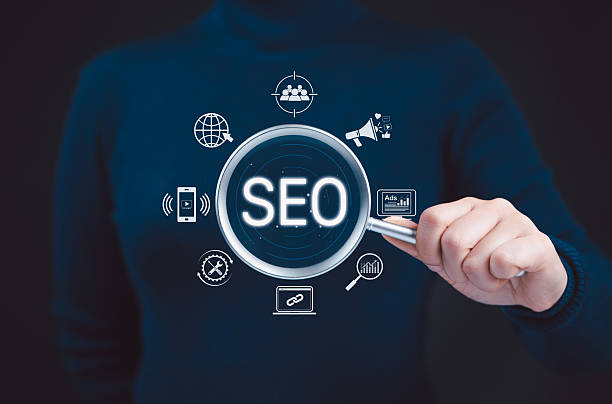
What is Local SEO?
Local SEO refers to optimizing your website and online business profiles to appear in local search results.
Local SEO is very important for businesses that provide services to customers in nearby geographic areas.
With Local SEO, you can attract more customers from nearby geographic areas and increase your sales.
Key Points in Local SEO
To optimize your business for Local SEO, you should pay attention to the following points:
- Registering with Google My Business: Register your business with Google My Business and provide accurate and complete information about your business.
- Collecting customer reviews: Ask your customers to post reviews about your business on Google My Business and other online platforms.
- Optimizing your website for local keywords: Optimize your website for local keywords, such as your city and region name.
- Creating local content: Create local content, such as articles and blog posts about local events and news.
By following these tips, you can optimize your business for Local SEO and attract more customers from nearby geographic areas.
In fact, SEO is an important method for gaining visibility.
Does your company’s website create a professional and lasting first impression in the minds of potential customers? Rasaweb, with its professional corporate website design, not only represents your brand’s credibility but also paves a path for your business growth.
✅ Creating a powerful and trustworthy brand image
✅ Attracting target customers and increasing sales
⚡ Get a free consultation
SEO Tools: Introduction and How to Use Them

Introduction to SEO Tools
SEO tools help you improve your website’s performance in search engines.
There are various SEO tools, each with its own unique features and capabilities.
Some of the most popular SEO tools include:
- Ahrefs: A powerful tool for competitor analysis, keyword research, and backlink checking.
- SEMrush: A comprehensive tool for keyword research, competitor analysis, website traffic analysis, and rank monitoring.
- Moz: A tool for keyword research, competitor analysis, backlink checking, and rank monitoring.
- Google Analytics: A free tool for analyzing website traffic and user behavior.
- Google Search Console: A free tool for monitoring website performance in Google search results and identifying SEO issues.
How to Use SEO Tools
To use SEO tools, you first need to create an account and connect your website to the tool.
Then, you can use various tools for keyword research, competitor analysis, backlink checking, rank monitoring, and website traffic analysis.
By using the information obtained from SEO tools, you can improve your SEO strategy and increase your website’s ranking in search results.
SEO becomes easier with tools.
The Future of SEO: Changes and Upcoming Trends
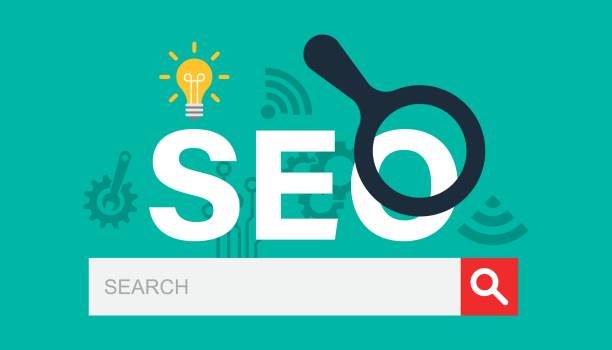
Changes in Search Engine Algorithms
Search engine algorithms are constantly changing and evolving.
Google implements several major and minor updates to its algorithm every year.
These changes can significantly impact website rankings in search results.
To succeed in SEO, you must always be aware of the latest changes in search engine algorithms and adjust your SEO strategy accordingly.
SEO requires up-to-date knowledge.
Upcoming Trends in SEO
Some of the upcoming trends in SEO include:
- Artificial Intelligence and Machine Learning: The use of AI and machine learning in search engine algorithms and SEO tools.
- Voice Search: Increased use of voice search and optimizing websites for voice search queries.
- Video Content: Increased importance of video content in SEO and optimizing videos for search engines.
- User Experience: Increased importance of user experience and optimizing websites to provide a better user experience.
Considering these trends, you should prepare your SEO strategy for the future.
SEO is an ongoing process.
Frequently Asked Questions
| Question | Answer |
|---|---|
| What is SEO? | SEO, or Search Engine Optimization, is the process of increasing the quality and quantity of website traffic by improving the site’s ranking in natural (organic) search engine results like Google. |
| What are the main types of SEO? | SEO is divided into three main categories: On-Page SEO, Off-Page SEO, and Technical SEO. |
| What does On-Page SEO include? | On-Page SEO includes optimizing elements within the website, such as keywords, title tags, meta descriptions, content, URL structure, images, and internal links. |
| What is Off-Page SEO? | Off-Page SEO refers to activities outside the website that help improve its ranking, such as backlink building, social media marketing, and brand mentions. |
| What is Technical SEO? | Technical SEO focuses on optimizing the technical aspects of a website to help search engines crawl and index it better. This includes site speed, mobile-friendliness, site structure, sitemaps, and the Robots.txt file. |
| What role do Keywords play in SEO? | Keywords are phrases that users enter into search engines. The correct and targeted use of relevant keywords in content and site elements helps search engines understand the topic of your page and display it for relevant searches. |
| What is a Backlink and why is it important? | A backlink, or inbound link, is a link from one website to another. Backlinks act as a “vote of confidence” from other sites for search engines and play a significant role in a site’s authority and ranking increase, especially if they come from reputable sites. |
| What impact does quality content have on SEO? | High-quality, relevant, comprehensive, and unique content not only attracts and retains users but also shows search engines that your page is valuable. This helps improve rankings, reduce bounce rates, and increase user dwell time on the site. |
| Why is site loading speed important for SEO? | Site loading speed is an important ranking factor for Google. Faster sites offer a better user experience, have lower bounce rates, and are preferred by search engines. |
| Is SEO a one-time process? | No, SEO is an ongoing and long-term process. Search engine algorithms are constantly changing, competition is increasing, and site content also needs updates. Therefore, SEO requires continuous monitoring, analysis, and optimization. |
And other services of Rasaweb Advertising Agency in the field of advertising
- Smart Direct Marketing: An innovative platform to improve customer acquisition by customizing user experience.
- Smart UI/UX: An effective tool to increase website traffic with the help of marketing automation.
- Smart Website Development: A dedicated service for growth in click-through rate based on marketing automation.
- Smart Marketing Automation: An effective tool to increase website traffic by utilizing real data.
- Smart Data Analysis: A combination of creativity and technology for digital branding through custom programming.
And over hundreds of other services in the field of internet advertising, advertising consulting, and organizational solutions.
Internet Advertising | Advertising Strategy | Advertorial
References
Comprehensive SEO Guide
What is SEO?
Free SEO Training
SEO Techniques in 2024
? Are you looking for your business to grow and gain visibility in the digital world? Rasaweb Afarin Digital Marketing Agency, relying on up-to-date knowledge and extensive experience in user-friendly website design and implementing effective online marketing strategies, is always ready to assist you on the path to achieving great successes.
📍 Tehran, Mirdamad Street, next to Bank Markazi, Southern Kazeroun Alley, Ramin Alley, No. 6



